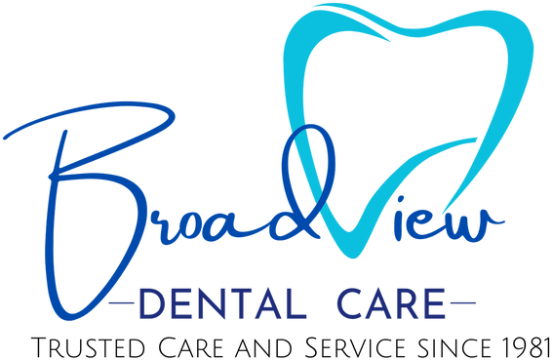Oral Surgery
Make room for your best smile.
Quick and Comfortable Extractions
Whether you need a tooth extraction to make room for orthodontic treatment or your wisdom teeth are causing discomfort, you don’t need to go out of your way to find a specialist.
Tooth extraction is a common procedure that can be performed in a general dental office—provided the dentist has the necessary experience and training. At Broadview Dental, our dentists have the expertise, tools, and technology to perform extractions safely and efficiently.
Extractions May Be Necessary for Orthodontics
Tooth extractions may be necessary to create space in the mouth and allow teeth to move into better alignment. We can work with your orthodontist to remove one or more teeth strategically to guide the remaining teeth into a healthier, more functional and more attractive position.

Your Wisdom Teeth May Not Be So Wise After All…
Wisdom teeth can lead to persistent jaw pain, headaches, and discomfort in the back of the mouth. They may also cause infection (such as pericoronitis) or damage to neighboring teeth.
That’s why monitoring their development and considering early, preventive extraction may help you avoid future complications and discomfort.

Our Patients Are the Best!
And we’re happy to hear they say the same about us.
Dr. Paul Yang is an excellent dentist!
Dr. Paul Yang is an excellent dentist! They are professional, kind, and made me feel comfortable throughout my visit. The clinic is clean, and the staff is very friendly. I highly recommend Dr. Paul Yang for great dental care!
I’m happy and very satisfied thank you !
I usually don’t leave reviews , but with the service I received I had to. I originally found Dr. Yang on yelp and saw ratings and thought why not give it a go. I love the way the reception and he took care of me. The place was warm and welcoming making it comfortable and easing any anxiety. I’m happy and very satisfied thank you !
Frequently Asked Questions About Oral Surgery
Like any surgical procedure, oral surgery does carry some risks, but serious complications are very rare—especially when we follow proper protocols and aftercare instructions. The most common and expected side effects include temporary swelling, bruising, soreness, and mild bleeding after surgery. These typically improve within a few days. Potential complications include: infection, bleeding, dry socket, nervy injury, swelling or jaw stiffness and sinus complications.
The type of anesthesia we use depends on the complexity of the surgery and your comfort level. For most routine oral surgeries, we typically use local anesthesia, which numbs the specific area we're working on so you won't feel pain during the procedure. If you would additional sedation option such as nitrous oxide (laughing gas), oral sedation, IV sedation or general anesthesia, we would have to refer to you a oral surgery specialist.
Some soreness, swelling, and mild discomfort are completely normal after oral surgery—especially within the first 24 to 72 hours. Most patients describe the pain as manageable and similar to what you might feel after a deep dental cleaning. Depending on the type of procedure, we may recommend over-the-counter pain relievers like ibuprofen or acetaminophen, or provide a prescription if needed. The discomfort usually peaks in the first couple of days, then gradually improves. By the third or fourth day, most patients are feeling significantly better.
Do not rinse or spit forcefully for 24 hours. Rinse gently with warm salt water. Avoid straws, smoking and disturbing the area with tongue or finger to prevent dry socket. Stick to soft, cool, cold food such as yogurt, soup (not hot, not spicy), scrambled eggs, smoothies. Avoid heavy lifting or intense exercising for at least 2-3 days.
Enjoy soft dairy such as yogurt, pudding, ice cream, milkshakes. Also, mashed potatoes, applesauce, Jell-O are great options!
